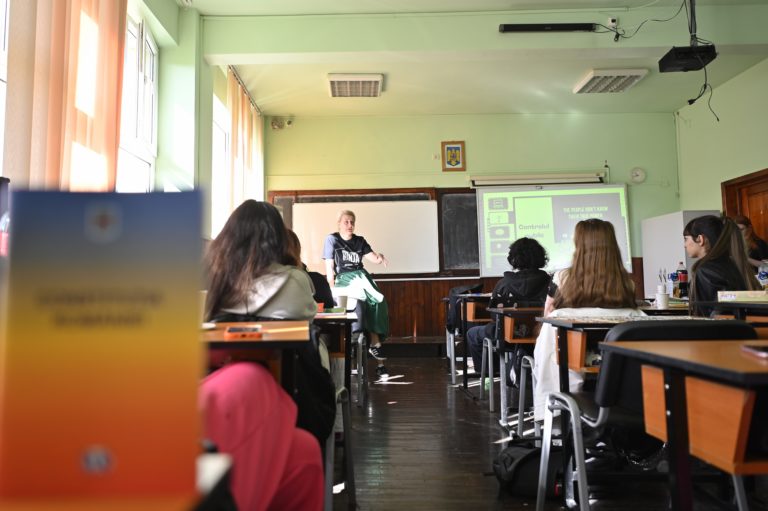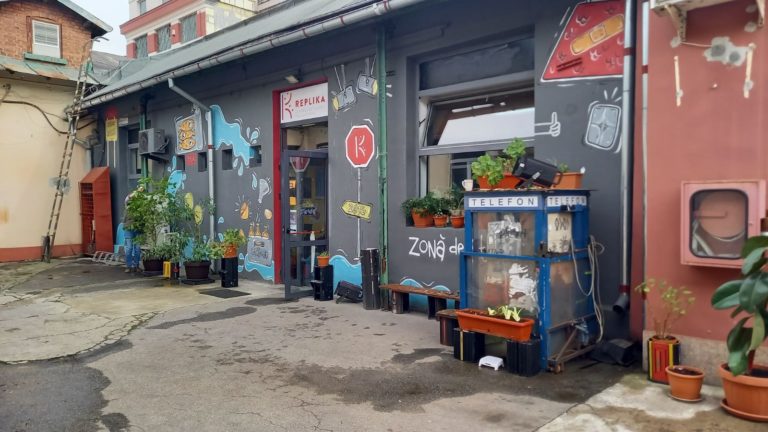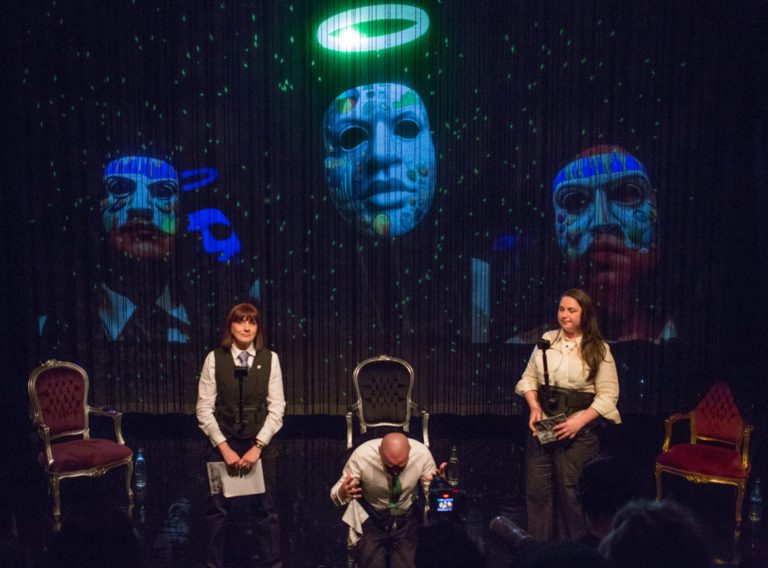Authors: Bianca Bălănescu and Andrei Petre
Romania may have narrowly avoided a nationalist turn with the election of centrist Nicușor Dan, but the battle for the country’s democratic structure is far from over. The presidential race, marked by disinformation, foreign interference, and a surging far-right emboldened by social media, has revealed and left deep scars on the country’s cultural and media landscape. As trust in journalism hits historic lows and independent cultural spaces face mounting political and financial pressure, Romania’s artists and journalists find themselves on the frontlines—not just of a political fight, but of a struggle to defend truth, critical thought, and public interest.

Cristina Lupu holding media literacy workshops in a Romanian school – © Romanian Centre for Independent Journalism
On May 18th, Romania elected centrist Nicușor Dan as its next president, following a tense runoff against George Simion, a far-right, anti-EU candidate who has built his campaign following Trump’s playbook. Consistent with his American idol, Simion has claimed victory and is now contesting the results, accusing fraud and interference from France and Republic of Moldova. In Brussels, the result was met with relief, as the country, at least for now, won’t be joining the ranks of nationalist-led states like Hungary, Slovakia, and Italy.
But the damage is already done.
This election came after an unprecedented constitutional crisis in 2024, when the Constitutional Court annulled the presidential vote amid allegations of Russian interference. The surprise front-runner then was Călin Georgescu, a pro-Russian, anti-EU candidate who surged to prominence with a TikTok campaign built on disinformation, blatant lies, and conspiracy theories. For his electorate, what mattered most was that he was seen as anti-establishment, a “man from outside the system.”
One week after Georgescu’s success, Romania suffered another blow: in parliamentary elections, far-right, nationalist, and eurosceptic parties captured a third of the seats, riding the momentum of Georgescu’s wave. Even if he was barred from running again, Georgescu’s far-right rhetoric had already been normalised and embraced by George Simion, who campaigned as Georgescu’s legitimate heir, as well as other candidates eager to appeal to the “sovereigntist electorate.”
With Nicușor Dan’s victory, the nationalist wave has been slowed, but the harm is clear and lasting. And independent media and cultural organisations are among the hardest-hit victims.
Trust Shattered, Truth Undermined
“People have lost all trust in everything,” says Cristina Lupu, executive director of the Romanian Centre for Independent Journalism (CJI). This sentiment is reflected in the latest Reuters Institute Digital News Report, which shows trust in Romanian news at a record low.
Lupu attributes this partly to the opaque funding of many media outlets, especially mainstream ones. Journalistic investigations have revealed that political parties funneled tens of millions of euros through intermediaries to television stations and online platforms, effectively turning them into propaganda machines.
And when parties can’t buy media, they attack it. Before the second round of the presidential election, George Simion insulted reporters and independent outlets, labeling them “the press of the establishment” and dismissing critical coverage as “fake news.” Anamaria Gavrilă, leader of the far-right Youth Party (POT), threatened journalists with lawsuits, warning that “they will go extinct soon.”
“These attacks deepen public distrust in the press,” Lupu notes. She warns that when some media lie or manipulate, people begin to think all journalists are dishonest, pushing audiences toward alternative platforms like TikTok, where extremist politicians thrive.
Journalists are supposed to be gatekeepers of truth and fact-checkers of public discourse, but by eroding trust in traditional media and pushing audiences to unregulated social media, nationalists sidestep accountability. “Social media amplifies disinformation, not journalism,” Lupu says.
Journalism is expensive and depends heavily on public funding. Yet, nationalists label the media as part of a “Soros network,” discrediting independent press and putting it at risk. “If you don’t pay for your information, someone else will, often with a political agenda.”
Asked about the consequences of normalised far-right rhetoric and media attacks, Lupu points to a classic authoritarian playbook. “Journalism and civil society are the first victims. If you silence them, you can act with impunity.”

Replika Centre for Educational Theatre – © Replika
Cultural Spaces Under Siege
Independent cultural organisations face threats from both the political establishment and the far right. Cultural funding has been steadily cut over the years, and now independent artists and institutions are scapegoated as representatives of “woke culture” seeking to poison traditional values.
Mihaela Michailov, co-founder of Replika Centre for Educational Theatre, an independent theatre tackling issues like labour rights and exploitation, gender roles, economic migration, LGBTQIA+ rights, and the flawed public education system, describes the mounting pressure.
“The constant blaming of the so-called ‘Soros network’ and ‘woke culture’ is nothing more than a rhetorical diversion, when all this time the real danger was the far-right,” Michailov says. “I feel vulnerable because we have always had a clear leftist vision, not only when it comes to our actual plays, but we hosted debates, workshops, and school talks too.” Replika’s positioning regarding these issues makes them, at least in the views of the far right, agents of influence threatening the nation’s values.
The biggest worry is financial. Like most independent cultural projects and organisations in Romania, Replika depends on grants and national cultural funds. “No one will close us outright, but economic censorship is real. We constantly fear not being able to host plays,” explains Michailov.
Beyond politics, Romania’s deficit, the largest in the EU, means inevitable tax raises and budget cuts, with culture an easy and certain target.
“Politicians don’t understand that culture is a public service,” Michailov says with frustration. “We got here [n.r. with the rise of the far right], because we neglected artists and educators. We neglected culture as an educational act.” Pointing out the indifference of the people in power, Michailov recalls a discussion she had with the former Minister of Culture, regarding the cuts to the budget for independent projects. “He wasn’t understanding what we were doing. He asked me why independent artists don’t get a job at the national theatres.”
Like journalism, the independent cultural sector is under-resourced and underpaid. Michailov says staff often take only half their salary to keep the space afloat.
“You can’t build a sustainable cultural project like this. These spaces survive because people sacrifice their lives and resources. When they burn out, these places will close.”

Show at Replika's theatre – © Replika
Facing the Future
The road ahead for Romania’s independent media and cultural sectors is uncertain and precarious. “It doesn’t matter who wins the presidential elections. Things won’t get easier,” warns Cristina Lupu, executive director of the Centre for Independent Journalism. “Trust in journalism is dangerously low, and the risk of further radicalisation remains very real.”
For Lupu, rebuilding that trust starts with the public recognition that journalism is a vital service, not a luxury. “People need to understand that journalists work in their interest. Without independent media, we would be blind to corruption, abuses, and threats to democracy.” She emphasises that support from both Romanian society and the European Union is critical—now more than ever: “Journalism cannot be sidelined when the EU discusses defense or economic priorities.”
Meanwhile, Mihaela Michailov, co-founder of Replika, underscores the urgency of safeguarding cultural spaces. “Politicians see culture as the least important thing, with no real stake,” she says. She stresses that without stable funding and political backing, independent cultural spaces risk disappearing.
Both Lupu and Michailov agree that independent media and culture are essential pillars of a functioning democracy. They hold the powerful accountable, challenge extremist narratives, and nurture critical thinking. The question remains whether those in power will finally recognise their importance and start acting accordingly.
Published on May 22nd, 2025
About the authors:
Bianca Bălănescu is an education activist, holds a Master’s degree in Equal Opportunity Policies from the University of Bucharest, and is currently involved in a research project on the audience of political theatre.
Andrei Petre is a Romanian freelance investigative journalist, reporting on environmental issues, corruption, and human rights. He has worked on cross-border investigations with The New York Times, Politico, Lighthouse Reports, and Deutsche Welle.